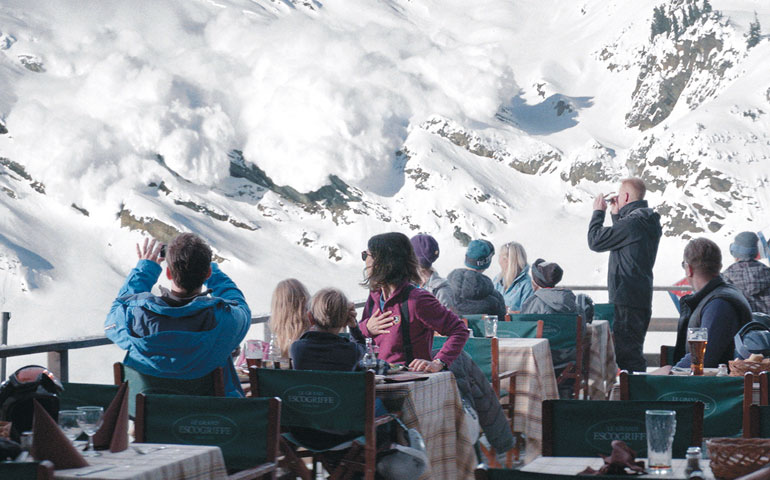
The avalanche approaches in "Force Majeure." (Photos by Magnolia Pictures)
At first glance, the climactic scene in the Swedish film "Force Majeure" recalls a blockbuster disaster flick. An avalanche, gathering power and mass as it rolls down the slopes of the French Alps, threatens to make a catastrophic landing on a posh ski resort where tourists are enjoying their lunch.
"It's controlled. They know what they're doing," Tomas (Johannes Bah Kuhnke) smugly reassures his wife, Ebba (Lisa Loven Kongsli), and their two kids (Clara and Vincent Wettergren), knowing that resorts routinely conduct artificially induced release measures to pre-empt potentially disastrous avalanches.
But Tomas' certitude crumbles by the second as the white monster gets closer and closer, until finally it crashes down on the restaurant deck, blanketing it in a thick avalanche cloud amid screams of terror. When the snow dust settles after a few minutes and visibility is restored, it becomes apparent that no real harm was done. Quickly recovering from the big scare, the flustered tourists simply brush off the snow and resume lunch.
All seems normal until it becomes obvious that Tomas is nowhere to be found. In that frantic moment, when the lives of his wife and kids could have been threatened, Tomas instinctively grabbed his iPhone and gloves and fled. When Tomas' self-preserving exit is laid bare, it is clear that the real avalanche, that which flies in the face of the security of his most vital relationships, has just begun.
Force majeure is a legal term denoting an unforeseen, disruptive event that obstructs the fulfillment of a contract. In the film, it is a synonym for avalanche; the contract in question, marriage and family. To be sure, "Force Majeure" is no disaster popcorn flick.
When Tomas reappears and takes his place back at the table, his family, shaken and fearful, is silent. It is a deafening judgment of his gutlessness. The avalanche has destroyed the veneer of contentment in what was initially established as an ideal, well-to-do family, out vacationing.
Up to this point, the camera frequently captures them acting in concert. In an early scene, they are in matching blue pajamas, snugly nestled together and sleeping soundly in one king-size bed. In another, they are brushing their teeth together, staring at their own reflections in a bathroom mirror.
But the cracks that belie the ad campaign image of familial bliss become subtly apparent in unguarded moments.
When they arrive at the resort, the in-house photographer has them do poses to simulate a postcard perfect family vacation pic; the resulting photographic images show none of the contrived awkwardness they felt in the actual photo session. Ebba also throws a sarcastic dart at Tomas' workaholic habits when she mentions to an acquaintance, "Tomas has been working too much, so now has five days to focus on his family." This would find symbolic validation in the continuing trope of the ringing iPhone, which constantly stalks Tomas.
It is Tomas' silence that is most deafening. He is too muscular to acknowledge failure, let alone apologize for it. So the rumblings of a different sort of avalanche begins.
In a masterful calibration, filmmaker Ruben Östlund constructs a gathering tempest of emotions where Ebba incrementally lets out her suppressed contempt. While having dinner with another couple at a restaurant, she mentions her family being unnerved by the freak event earlier that day.
Immediately, Tomas is defensive, emphasizing that they're all fine. Ebba retorts, "You ran away." A repartee ensues between the two as to whose version of the story is true; the tension, buffered as it is by the social setting, is uncomfortably real but still contained.
When they later decide to host dinner for yet another couple, this time, in the more intimate setting of the dining room of their resort suite, Ebba puts Tomas on trial. She retells the avalanche story in its shame-filled rawness, detailing that Tomas grabbed his gloves and iPhone, "running like hell away from us."
In the labored argument, the guest couple could not help but take sides based on their respective genders; the woman offers her sympathy to Ebba while the man becomes an apologist for Tomas, whom he sees as having acted on survival mode.
The unresolved issue escalates into a string of full-blown arguments between Tomas and Ebba, which takes its toll on the kids.
The dramatic arc reaches an emotional crescendo when the avalanche of truth finally overtakes Tomas' denial. In the film's most rending scene, he begins to sob uncontrollably. Ebba does not know what to make of it; she appears half-confused, half-embarrassed.
Seeing the pathetic sight of their father sobbing face-down on the floor triggers an instant response of forgiveness from the kids, each running to embrace him. Noticing that her mother has not done the same, the little girl pulls her in to join them.
They form a mountain of support over Tomas, as though symbolically issuing a healing response to the avalanche. It is worth mentioning, though, that as touching as this scene may be, Östlund doesn't make it easy. Supposedly a drama cum dark comedy -- to be sure, more of the former -- Tomas' overwrought hysterical sobbing is slightly comical. You wonder if these are tears of true remorse or of the crocodile variety.
"Force Majeure" offers plenty of conversation points on marriage and family. For me as a Catholic, it certainly fuels my anticipation for the upcoming Synod of Bishops on the family. But widening the aperture, it also makes me reflect on the inarguable truth that none of us is exempted from the contradictions wrought by our human finitude and imperfection. It took the apostle Peter the ultimate force majeure to realize it on strike three. We should take the hint.
[Precious Blood Br. Antonio D. Sison is author of World Cinema, Theology, and the Human (2012), and is a faculty member at Catholic Theological Union in Chicago. "Force Majeure" is available on DVD and Blu-Ray from Magnolia Pictures.]



